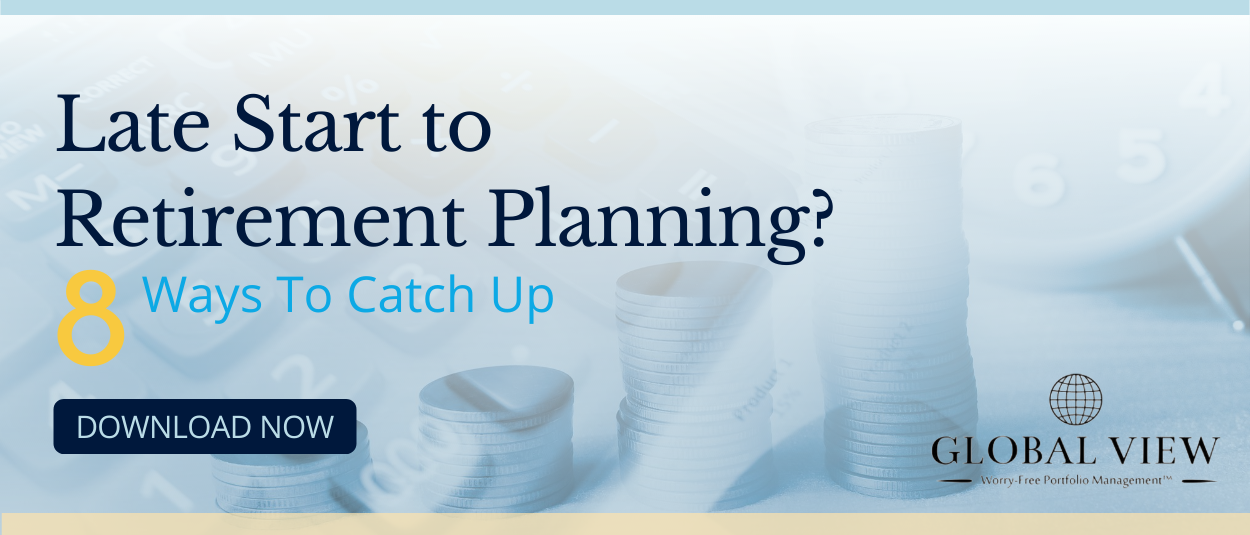Global View Investment Blog
Bear Market Advice For Retired Investors
We understand that you may have some questions about investing in a bear market that need to be answered by experienced retirement financial planners. Because a bear market creates a bit of an uproar in the hold or sell debate, now is the time to revisit your comprehensive financial plan.
As a fee-only investment advisor serving those retiring in Greenville, SC, we are noticing many retired investors are concerned about losing money during this period featuring:
- High inflation
- Lower interest rates
- High unemployment
- Uncertainty in politics and technology
This is an ideal time to ensure that your portfolio is sound before making any drastic changes or withdrawals. Here are some tips for keeping your finances on track during this tricky economic period.
Check your cash reserve without panic
You can make informed decisions moving forward by checking how much cash you have in reserve during a bear market. Our advocate advisors at Global View will tell you not to panic—don't sell your investments without speaking with a fiduciary financial planner with your best interest.
Reassess your risk tolerance
You should reassess your risk tolerance to uniform your investment strategy with your retirement goals. Do you find yourself feeling more anxious than usual about the market's ups and downs? It may be time to talk to CERTIFIED FINANCIAL PLANNER™ in Greenville, SC, who can help evaluate your financial standing.
If you are overly concerned about risk at this point in your life, it could lead to missed opportunities for growth. We can help ensure you don't make changes too quickly because of one bad experience.
Ensure your portfolio is appropriately diversified
Diversification is the practice of investing in various financial securities to reduce the risk of loss and provide a more consistent return. A diversified portfolio usually consists of stocks, bonds, and cash equivalents like money market funds and certificates of deposit (CDs). Diversifying your assets can help you reach your investment goals while minimizing risk by spreading your money across different investments based on individual risk levels.
Ask our investment advisors in Greenville, SC, about getting a risk assessment to see if your portfolio is well-balanced based on your risk tolerance and time horizon.
Update your strategy
Review your investment goals: Make sure you're still on track to meet them. If you've changed your mind about how much risk you want to take in pursuit of a certain level of return, then reposition your portfolio accordingly.
Review your asset allocation: This is the percentage breakdown between stocks and bonds that comprises your portfolio's makeup. Reviewing it will help ensure that you're still comfortable with having so much money invested in the stock market at this point or whether it makes sense to shift some assets toward safer investments given the volatility of recent months.
Review your risk tolerance: Have any major life events happened since last year? Has something happened that might have affected how comfortable you are with investing? For example, many people change their minds about what they can tolerate losing after getting married or retiring.
See if your asset allocation needs to change
When determining if your asset allocation needs to be altered, examine where it stands.
Look at your portfolio and track its performance over time. If the value of your assets has decreased significantly since purchase, it may be time for a reevaluation. You should also note how many years you’ve been investing and how long they have taken before showing any returns.
Now determine whether or not other factors might influence whether or not an investment should be sold off. For example: did you recently make a mistake with one of your investments? Did some unexpected expenses come up? These things could undoubtedly impact whether or not selling off some of your holdings would be wise for them not only to grow again but to keep growing consistently over time (to help mitigate risk overall).
Finally, create a list of which securities are currently held along with their current values and performance history. Then take out each security one by one, examining each factor before making any changes. This includes knowing where they fit into their original risk tolerance categories and which stocks have performed better than others under similar circumstances.
It is best to have a fiduciary financial advisor analyze your portfolio.
Don't time the market
When investing in bear markets, the first thing is not to try and time the market or predict where it will go. While it might be tempting to buy at the bottom and sell at the top, this kind of speculation can lead you to make poor decisions that can cost you money. The best strategy for investing through a bear market is one of patience.
Look for ways to lower costs
There are a few ways to lower costs:
Make sure you're using the right investment advisors in Greenville, SC. You can find out if an advisor meets the criteria that we believe an advisor should have. We believe a Fee-Only Advisor is the only way to truly put your interest first. The best search tool is NAPFA.org (The National Association of Financial Advisors) is registered with
Make sure you're using the right investment vehicles. The types of investments and allocation you choose will depend on your risk tolerance, time horizon, goals, and financial situation, but there are some general rules of thumb:
- Generally speaking, stocks tend to perform better than bonds over time.

- Higher-risk assets tend to perform better than lower-risk ones when markets are rising.
- Bonds often outperform stocks during periods when interest rates decline (when economies are weak).
- You can also consider alternative investments like real estate or commodities. Still, these may require additional research before investing since they aren't structured like traditional securities.
And finally, make sure you're using the right investment strategy. Our team of advocate advisors are more than happy to have a complimentary conversation with you to assess your current investment strategy.
Don't forget that having a plan is more important than timing the market
Remember that a plan is more important than timing the market.
If you haven't already, sit down with a CFP® and develop a plan for your investments. Make sure you understand all the risks, fees, and the tax implications of your investment decisions. Don't forget to consider how your retirement funds fit into your overall financial picture.
Bottom line: Don't let market volatility distract you from having a solid investment strategy!
Takeaway: Stick with a healthy plan and strategy
The best thing you can do within a bear market is to stay calm. No one expects this bear market to last forever, but it won't be easy to weather in the short term.
It's vital that your investment plan works for you and provides solid returns over time. If your investment strategy isn't meeting your goals, make any necessary adjustments and stay on track with your plans as much as possible until things improve.
With the right strategy in place and an understanding of what it takes to succeed as an investor, backed by a fiduciary financial planner in Greenville, SC, you can take comfort in knowing that any downturn will eventually turn around.
The key is sticking with your plan, making adjustments when things don’t go according to plan and remaining on track toward your goals. Give us a quick call to get your questions answered today!

Written by Joe Hines
Joey's primary focus is working with clients in the goals setting and financial planning process. He has extensive experience is in helping clients facilitate the decision making process, leading them through the implementation of their financial plan and contributing to their peace of mind. This includes helping clients gain an understanding of estate planning, charitable giving, and helping them implement these plans by working closely with estate planning attorneys.
Are you on track for the future you want?
Schedule a free, no-strings-attached portfolio review today.
Talk With Us






